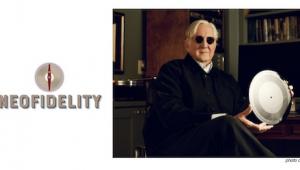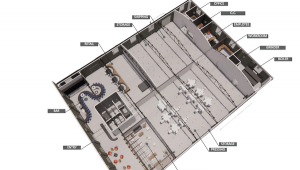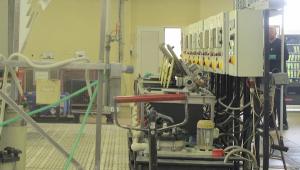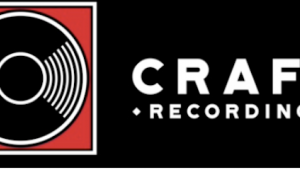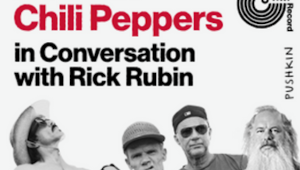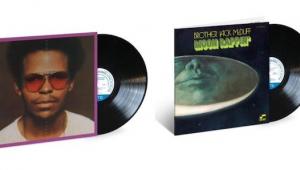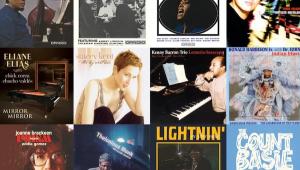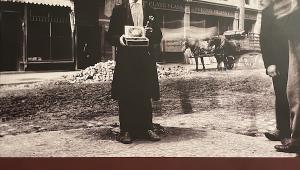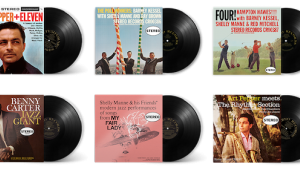I still remember back in the mid 90s in the Stereophile NYC show at Waldorf Astoria, attended a live concert by you can't take my blues Doug MaCleod, I sit next to Sax, and even chatted with him about whether he would issue HDCD titles from Sheffield catalog. Very nice gentleman.
Legendary Mastering Engineer Doug Sax Has Passed Away

This newly posted photo was kindly supplied by mastering engineer Eric Boulanger (with thanks to Bob Ludwig), who will continue cutting at The Mastering Lab, which will remain open. Doug stands proudly in front of his 4 lathe set-up attached to MGM's scoring stage, probably taken in the 1982, which is when The Sheffield Track Record was first released. The main room is now the Barbra Streisand Scoring Stage and this room is now ADR3 (ADR stands for "automatic dialog replacement").
I have known for a while now that his cancer had returned and that he had chosen to not again undergo treatment but his passing came far sooner than many who did know and kept it under wraps had anticipated. A source told me he's been "close for more than a week".
I was working on an obit, but now, forget it. I'll just "stream".
Doug Sax was one of those legends in the business that everyone knew, loved and of course respected. Audiophiles may have become aware of him in the '70s by reading Stereophile or The Absolute Sound, or through the stunning recordings he released on his Sheffield Labs label that he co-founded with the pianist Lincoln Mayorga. His mastering facility, The Mastering Lab, is one of the world's best sounding, especially with Doug at the lathe. Of course he moved into digital mastering as well.
Sax was a proponent of tube electronics and upon its introduction not at all a CD fan. He famously distributed a T-shirt with "Stop the Digital Madness" on it in large letters. He did not like early CD sound and was never convinced the early productions using video tape storage achieved 16 bit resolution.
Sax understood the issues involved with proper LP playback and realized that for the average person CD was fine, but he also acknowledged that he knew what the tapes sounded like because he made many and mastered using many others and he said when he heard the CD versions they never got what he knew was on the tapes.
He knew digital was going to be in our futures and that for it to improve it had to be acknowledged that it wasn't so good! That may sound obvious but when the CD was introduced the pressures were intense to declare it perfect and hype the crap out if, which most in the industry were happy to do. Not Doug.
He was the favorite lacquer cutting engineer for many recording artists back when recording artists usually didn't pay attention to such things. Among them are Pete Townshend and Roger Waters. If you look at an original Decca "Quadrophenia" or an original U.K. Track version, you'll see on both the famous TML (The Mastering Lab) stamp followed by a letter "M" for main, or "S" for "slave". "X" was the second slave lathe.
When vinyl appeared all but finished, Doug retired his lathes, but he didn't sell them. He moved The Mastering Lab from Los Angeles to Ojai and some years later when orders came in for lacquer cutting, Sax realized there was a business to be had in vinyl and he resurrected the "M" and "S" lathes. He was once again cutting great records—like the Analogue Productions Doors double 45s. A full list of his credits would take many pages.
After having read about Doug and enjoying so many of the records he mastered, I finally got to see and meet him at a CES in the early 1980s. For an audio geek it was like meeting a rock star, which he surely was among audiophiles and his peers. Back in 1979 when I was working on the animated film "Animalympics", the producer hired the late Jimmie Haskell to compose and produce the incidental music (at my suggestion 10cc's Graham Gouldman wrote the songs). I had to choose classical music for the gymnastics "competition" and ended up with an excerpt from the original piano arrangement of "Pictures at an Exhibition". Rather than go through the hassle of licensing a recording, Haskell got a musician he knew to play and record it. It was Lincoln Mayorga.
A few years ago when Bob Ludwig invited me to appear on an AES mastering panel with Doug and him and later at one at SXSW, for me it was a deep honor that to this day I have trouble believing actually happened. I am hardly a mastering expert. I just have a way of communicating why vinyl, much to Sax's and Ludwig's surprise, came back.
Doug Sax at CES 2014
In a long interview published in Stereophile back in 1989, Bob Harley, then with the magazine and now editor at The Absolute Sound asked Sax:
What is the future of LPs?
Sax: If there's a future in this? [points to his cutting lathe] If digital gets itself together, it will never come back. There will never be any reason. But let's say digital doesn't get any better than it is today—then this will be sort of like tube amps where you have more people wanting to buy them in five years, critical listeners, than want to buy them now. This lathe—made by Scully in 1948, the first lathe made in this country that had the ability to vary the spacing between the grooves on command from the program—made my first record. If you get a piece of equipment that you use professionally for 20 years, generate income from, you've got a good investment. There is a visual value for machinery that looks like machinery instead of like kiddy toy stuff. And the black disc itself, I've always enjoyed the whole look of it. When you get a perfect disc, a master lacquer that you cut just right, there is a look to it, a shine. You have a finished product that you can look at without even listening to it and say, "I made that good." And you never get that feeling when you ship out a CD master tape. This lathe will go home with me when it retires.
Harley: You must be attached to it after all this time.
Sax: In one sense yes, in another no. I don't want to be wedded to the past, but I don't want to forget its virtues.
When it was retired, the lathe did go home with Doug Sax. Enough people remembered its virtues for it to be pressed back into service.
Now Doug Sax has gone home and we will forever remember his many virtues at and away from his mastering suite every time we play a record he mastered.
- Log in or register to post comments

I only own 1000+ LPs, but when I want to play a record for any devotees of the compact disc, I do James Newton Howard and Friends (basically the entire Porcaro family) on The Sheffield label.........just stunning.
So sad, a treasure to music lovers is gone. Thanks for your sentiments Michael.
Play on

I was stunned to hear the new that Doug has passed. It's so true that we audiophiles feel we know these great mastering engineers personally... we follow their work so closely. I recently helped fund a Kickstarter campaign by saxophonist Jerome Sabbagh, who wanted to produce his album 'The Turn' on vinyl the best tit could be done affordably. It's my understanding that Doug mastered the CD and mastered the LP for vinyl to be pressed at QRP in a run of 500 LPs. If Doug did master this pressing, it would have been one of his last projects and will make that record even more precious to me when it finally comes from QRP. God bless you for all you did for each and every audiophile and music lover, Mr. Sax. You will forever be missed.

on vinyl the best it could be done affordably.

So sad to learn of the passing of the great Doug Sax, we've lost a true master craftsman.
Last year I met Carmen Lundy at a record signing session here in London and she spoke so highly of Doug, stating "my mastering engineer is the great Doug Sax". She also said that she always attended the mastering sessions.
Doug mastered the cd release of Carmen's latest album Soul To Soul last year and a vinyl release is scheduled later this year hopefully also mastered by Doug.

A legend passes on ... awful news and a shock. I was talking about him in the past few days with a fellow audiophile. Thank you Mr. Sax for all the great work you have left behind for present and future generations to enjoy and appreciate. Rest in Peace.

Wow,another audio icon is gone. What incredible talent Doug had. Yes he is gone, but not forgotten when you spin one of his many masterpieces. RIP.

I am truly saddened by Doug Sax's passing. He was one of the greats of mastering, quite possibly the best mastering engineer ever. I have many fantastic sounding records he worked on. It was a dream come true for me to work with him, and an honor, indeed.
I learned he was sick when I finally got the funding together to finance the pressing of my record "The Turn" through Kickstarter. Doug had already mastered the digital versions with Jett Galindo (and they had done, in my opinion, a fantastic job, making everything better without doing too much) and we had been in contact about the vinyl. I was deeply touched that he made it a priority to see this project through and cut the record. I am grateful I got a chance to work with him, if only once.
As a musician and a lover of good sound, Doug Sax's work will always be a benchmark for sound quality and integrity, for me and so many others.
My condolences to his family, loved ones and everyone at The Mastering Lab.
RIP Doug Sax, and thank you!
Jerome Sabbagh


God bless him, his legacy and all that he loved.

...I pulled out my copy of "The Missing Linc" and played it back using a Stanton 881S cartridge.
http://www.regonaudio.com/Stanton881AudioTechnicaATML70.html

I dug out some of my favorite Doug Sax mastered LP discs and played them in honor of a legend and fine engineer who made great sounding records. I am in mourning, and am in shock.

Doug was a brilliant, funny, curmudgeon and I respected and loved him. Today I'm in shock. I knew he was very ill but it was way too soon - he still had so much to do. He was a very special man and he left behind an amazing legacy. He touched a lot of people. He touched me....Clair Marlo

I knew Doug Sax for 20 years and worked for him for 13 years and I am deeply saddened to learn of his death.
I’m sorry I had lost touch with Doug in these last few years and was just about to write him this week, so this sad news leaves me with a sting of regret for an opportunity missed to reconnect.
For a music lover and audiophile, to spend time with Doug was an amazing and rich experience.
To see the look of concentration on his face as his listening to his monitors to the live feed from Sheffield Lab session or when working as the engineer at The Mastering Lab, you knew you were watching someone with extraordinary skill helping craft the music to a higher level.
I am fortunate to have many memories of wonderful moments spent with Doug and with particular fondness recall the Sheffield Lab recording sessions watching him, along with his partner Lincoln Mayorga, help evoke and capture something magical.
I do take pride in an idea I gave to Doug that led to a unique Sheffield Lab record, The Sheffield Drum Record.
But it wasn’t actually my idea at all, it was an idea I “gave back” to Doug.
When I first met Doug in 1972 for an interview for Audio magazine, he graciously invited me to his house for dinner.
After dinner Doug rummaged in his garage to find some interesting albums to play for me. He pulled out something in a white jacket with a test label and said “Oh, this is really interesting, it sort of made the point to me that direct disc really had something to offer.”
Doug explained this disc was a short drum demonstration by Dennis St. John which I believe might have been recorded in 1969. Dennis had been recording in Producers Workshop studio which was in the rear portion of the building that housed The Mastering Lab. Doug got the idea to make a recording of Dennis’ improvising and record the signal both to conventional analog tape and also send the feed live to a lathe to cut a direct disc master lacquer.
Doug was able to then press an album in which the same performance was on one side was cut from tape and on the other side it was a direct disc.
The direct disc recording had some remarkable qualities in terms of transient response, clarity, tautness, extended bass response, and “filigree and lace” in the harmonics as Doug would say, and sounded amazing. Doug handed me that test pressing to take home as a souvenir.
About 8 years later when I was working for Sheffield Lab, I brought that disc with me to our first CES Showroom at the Pick Congress in Chicago. Esteemed audio critic and recording engineer Bert Whyte dropped by our show room. I had a feeling he would appreciate the Dennis St. John direct disc demonstration album so I played it for Bert.
Bert loved the recording and raved about it in Audio Magazine. Peter Moncrief of the International Audio Review then somehow got a copy of that demo disc and also lavished it with praise.
I talked to Doug and said “Look at how these audiophiles love that disc you cut of just a drum improvisation. Have you ever considered doing a new drum album as a sort of definitive demonstration disc? “
Pretty soon Doug began really thinking about this seriously and consulting both Lincoln and recording engineer and crony Bill Schnee.
A few months later I found myself in the soundstage at (then) MGM Studio with both Jim Keltner (drummer to the superstars) and also Ron Tutt (Elvis Presely’s drummer.) They were each going to record one side of this demonstration disc by creating their own drum improvisation. My job was to sit in from of their drum sets and signal them when they have played 6 minutes so they knew they had about a minute to finish their solo.
When the direct disc of The Sheffield Drum Record came out it established a fearsome reputation as a demonstration record. It was nicknamed “the lease breaker” by some fans. And that record led Doug to conceive of The Sheffield Track Record, another great demonstration record. And that record included James Newton Howard who later was featured on his own Sheffield Lab release with most of the members of Toto.
Like many others posting here, I’ll be revisiting some of the wonderful music Doug cut as a mastering engineer both for Sheffield Lab and some of the great commercial artists who were his clients and I will filled with appreciation for his talent as well as being deeply twinged with sadness.
Andrew Teton
Santa Barbara

What better complement in life is to know that millions of people love and admire you life's work and enjoy it every day as we all do. He will be greatly missed.

Condolences to Mr. Sax's family and friends.

Today is a sad day for music lovers, audiophiles, and those who just appreciate genius. Doug Sax, legendary mastering engineer, story teller, and great friend has passed.
After becoming a huge fan I had the privilege of working for Doug at Sheffield Lab. I believe I learned more about audio from him than from any other source. Listening to his dissertations on sound recording technology was staggering. Within seconds, you knew his opinions and findings were absolute and based in fact, learned, not imagined.
Fire up your turntables, rummage through your LP collection and find a Sheffield Lab LP and play it again for the first time.
RIP Doug Sax

I just received a message from Jerome Sabbagh, whose album you recommended to us some time ago Mike. He funded the vinyl version through Kickstarter, and is in the final bits before releasing it to his backers. Doug worked on the project with him through the cutting of the master.
So those of us who bought the vinyl may very well own one of the last projects Doug worked on. Sad to see him gone.

Condolences to the family of Doug Sax, one of the greatest mastering engineers and audio people of all time. I so enjoyed his insights in the early 80's TAS interviews. RIP. Mr Sax..

Hearing the grooves of the Sheffield Distinguished Colleagues Volume 2 LP being traced by a Decca Blue and played into the original Tympani I's in 1972 changed my life. What a huge influence Doug Sax had on our standards for reproduced music.

When I started realizing just how different (and better) my recording couild sound, invariably I found either Doug Sax or Bob Ludwig's names on the notes of the record.

Vale Doug Sax. Too few mastering engineers get fair recognition. Doug must have been pleased with his career and recognition, which I hope inspires more good men and women into the profession.

I am so sorry to hear of Doug's illness and passing. The very best recording I have and have really ever heard is Dave Grusin's "Discovered Again" on Sheffield Labs Direct to Disc (Lab-5) which was recorded and mastered by Doug Sax and Bill Schnee. It remains a reference point for me in so many ways...the sound of the drum set, the standup bass, the piano....not to mention Grusin's all-star ensemble's incredible musicianship. Doug Sax was the best, period, and he, Lincoln Mayorga and the great Bill Schnee made one hell of a team.
While he was critical of digital, he was pretty damn good at getting good sound out of it. Case in point, I have a CD of Discovered Again which sounds lot like the LP...not as much detail, but not gritty like a LOT of digital from that era. It is a very useful tool, however, for setting up cartridges. If you adjust your VTA so the timbre of your LP matches that of the CD, you don't need Mikey's microscope to know you've got it right. Doug did such a good job on equalization on both media, that it remains a foolproof way to know if you set your cartridge up correctly, every time. Now every time I hear Ron Carter's beautiful bass, I will think of Doug, and how much he loved and gave us such great sound.

He lived to see his recording make it into the National Recording Registry on March 25th.
"Lincoln Mayorga and Distinguished Colleagues" (album)—Lincoln Mayorga (1968)
During college, pianist Lincoln Mayorga became disappointed with the sound of classical piano LPs when compared to those recorded on 78s. Mayorga and longtime friend Doug Sax thought that the tape recorders used for most LP mastering might be the reason. Together, they pooled their resources for a $10 direct-to-disc test recording which supported their theory, but after later unsatisfactory attempts at existing studios, they ultimately concluded the only way to achieve the sound quality they wanted was to set up their own mastering lab, built primarily by Doug’s brother Sherwood. In 1968, to promote their new venture, Sheffield Lab, they recorded "Lincoln Mayorga and Distinguished Colleagues" direct to disc, running lines from the studio to their next door lab. Eschewing the use of tape recorders meant that the musicians had to play an entire LP side uninterrupted. Hence, if a mistake was made, they had to start over from the beginning. The quantity was limited by the number of cutting lathes because there was no tape master. Each master could be used to make only a limited number of copies before the sound quality deteriorated. Sheffield began selling copies in high-end audio stores in 1970. The response from audiophiles was enthusiastic. Listeners were forced to revise upwards the sound quality capability of LPs. However, major labels didn’t adopt direct-to-disc mastering because of the expense and limited pressing quantities. "Lincoln Mayorga and Distinguished Colleagues" may not have changed the way most LPs were made, but it raised the bar by showing how good one could sound."

It was really a big loss, no doubt he was a great musician and his space can never be filled out.
Corey - www.musicprofessor.com

It was truly a significant loss. There's no doubt that he was an incredible musician, and his space can never be filled. Sprunki Mod

Join Block Breaker for 150 exciting levels and endless fun. No downloads required—just pure arcade action anytime, anywhere.

Doug Sax’s passing is a profound loss for the audio world. A mastering legend and analog sound advocate, his work at The Mastering Lab and Sheffield Labs set the gold standard for audio quality. His passion for preserving the integrity of sound, even as digital technology advanced, inspired countless audiophiles and artists. Though he is gone, his legacy lives on in every record he touched. Doug Sax will be deeply missed, but his contributions to music and sound will resonate forever. Rest in peace. OvO Game






